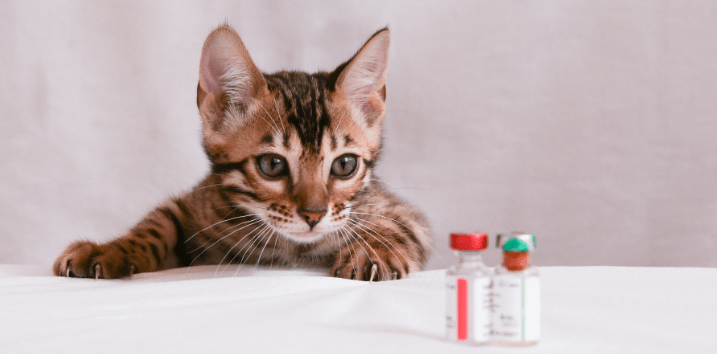The Complete Guide to Kitten Vaccination

Welcoming a new kitten into your home is an exciting and joyful experience, but it also comes with the responsibility of ensuring their health and well-being. One of the most crucial aspects of kitten care is vaccination. Vaccinations protect your kitten from serious and potentially life-threatening diseases, helping them grow into healthy adult cats. In this guide, we’ll cover everything you need to know about kitten vaccinations, including the vaccination schedule, costs, and what to expect during the process.
Why Are Vaccinations Important for Kittens?
Vaccinations are crucial for protecting kittens from a variety of infectious diseases that can be life-threatening. At birth, kittens receive some immunity through their mother’s milk, but this protection is only temporary. As the maternal immunity diminishes, vaccinations become essential to safeguard kittens from harmful pathogens. Vaccines help by stimulating the kitten’s immune system to develop antibodies against specific diseases, offering long-term protection. To ensure your kitten is protected, consider scheduling their vaccinations at a kitten vaccinations near me.
Core vs. Non-Core Vaccines
Vaccines for kittens are typically divided into two categories: core and non-core vaccines.
- Core Vaccines: These are essential for all kittens and protect against common and highly contagious diseases. Core vaccines include:
- Feline Viral Rhinotracheitis (FVR)
- Calicivirus (FCV)
- Panleukopenia (FPV)
- Rabies
- Non-Core Vaccines: These are optional vaccines that may be recommended based on the kitten’s lifestyle, geographic location, and risk factors. Non-core vaccines include:
- Feline Leukemia Virus (FeLV)
- Feline Immunodeficiency Virus (FIV)
- Chlamydia
- Bordetella
Kitten Vaccination Schedule
The vaccination schedule for kittens typically begins when they are 6 to 8 weeks old and continues until they are about 16 weeks old. This schedule may vary slightly depending on your veterinarian’s recommendations and your kitten’s health status.
- 6-8 Weeks:
- FVRCP Vaccine: This combination vaccine protects against Feline Viral Rhinotracheitis, Calicivirus, and Panleukopenia. It is the first dose in a series of three.
- FeLV Vaccine: This vaccine may be recommended if your kitten is at risk of exposure to Feline Leukemia Virus, especially if they will be spending time outdoors.
- 10-12 Weeks:
- FVRCP Vaccine (2nd Dose): The second dose of the FVRCP vaccine is administered to boost the initial immunity.
- FeLV Vaccine (2nd Dose): If your kitten received the first FeLV vaccine, a second dose will be administered at this time.
- 14-16 Weeks:
- FVRCP Vaccine (3rd Dose): The final dose of the FVRCP vaccine completes the series, ensuring strong immunity.
- Rabies Vaccine: This vaccine is usually given around this age, as rabies is a serious disease that is often required by law to vaccinate against.
- 16-20 Weeks:
- FeLV Booster: A booster for the FeLV vaccine may be recommended for ongoing protection, particularly for kittens with outdoor access or those living in multi-cat households.
Booster Vaccinations
After the initial kitten vaccination series, your cat will require booster vaccinations to maintain immunity. The timing of boosters varies depending on the vaccine, but they are typically administered every one to three years. Regular veterinary check-ups will help determine the appropriate schedule for booster shots.
Costs of Kitten Vaccinations
The cost of kitten vaccinations can vary based on your location, the veterinary clinic, and the specific vaccines administered. On average, the cost for the core vaccine series (FVRCP and Rabies) can range from $50 to $100. Non-core vaccines, such as FeLV, may add an additional $20 to $40 per vaccine.
It’s important to note that these costs may be bundled into a wellness package offered by some veterinary clinics, which can include exams, deworming, and other preventive care. Investing in your kitten’s vaccinations is crucial for their long-term health, and it’s a small price to pay to prevent serious diseases.
What to Expect During Vaccination Visits
When you bring your kitten in for vaccinations, the veterinary visit will typically include a thorough physical examination. Your veterinary doctor in Delhi will assess your kitten’s overall health, including their weight, temperature, and physical condition, to ensure they are healthy enough to receive the vaccine.
Vaccinations are generally administered via injection, and most kittens handle the process well. Some may experience mild side effects, such as slight discomfort at the injection site, lethargy, or a low-grade fever, which usually resolve within a day or two. In rare instances, kittens may have an allergic reaction to a vaccine, with symptoms such as swelling, vomiting, or difficulty breathing. If you observe any of these signs, contact your veterinarian immediately for prompt care.
Read also: Elevate Your Pet’s Comfort with a Personalized Custom Dog Pillow
Tips for a Smooth Vaccination Experience
To make the vaccination process as stress-free as possible for both you and your kitten, consider the following tips:
- Stay Calm: Kittens can pick up on your emotions, so try to remain calm and reassuring during the visit.
- Bring Comfort Items: A favorite blanket or toy can help your kitten feel more secure at the veterinary clinic.
- Schedule Wisely: Choose a time for the appointment when your kitten is usually calm and relaxed, such as after a nap.
- Reward Good Behavior: After the vaccination, reward your kitten with gentle petting, praise, and maybe a small treat.
Conclusion
Vaccinating your kitten is one of the most important steps you can take to ensure their health and well-being. By following the recommended vaccination schedule and keeping up with booster shots, you’re giving your kitten the best possible start in life. Remember to consult with your veterinarian about your kitten’s specific needs and any additional vaccines that may be necessary based on their lifestyle. With proper vaccination, your kitten will be protected against some of the most dangerous diseases, allowing them to grow into a happy, healthy adult cat.




